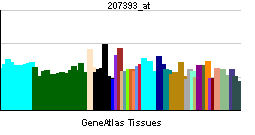Hypocretin (orexin) receptor 2
| Hypocretin (orexin) receptor 2 | |||||||||||
|---|---|---|---|---|---|---|---|---|---|---|---|
| Identifiers | |||||||||||
| Symbols | HCRTR2 ; OX2R | ||||||||||
| External IDs | Template:OMIM5 Template:MGI HomoloGene: 1168 | ||||||||||
| |||||||||||
| RNA expression pattern | |||||||||||
 | |||||||||||
| More reference expression data | |||||||||||
| Orthologs | |||||||||||
| Template:GNF Ortholog box | |||||||||||
| Species | Human | Mouse | |||||||||
| Entrez | n/a | n/a | |||||||||
| Ensembl | n/a | n/a | |||||||||
| UniProt | n/a | n/a | |||||||||
| RefSeq (mRNA) | n/a | n/a | |||||||||
| RefSeq (protein) | n/a | n/a | |||||||||
| Location (UCSC) | n/a | n/a | |||||||||
| PubMed search | n/a | n/a | |||||||||
Hypocretin (orexin) receptor 2, also known as HCRTR2, is a human gene.[1]
HCRTR2 is a G-protein coupled receptor expressed exclusively in the brain. It has 64% identity with HCRTR1. HCRTR2 binds both orexin A and orexin B neuropeptides. HCRTR2 is involved in the central feedback mechanism that regulates feeding behaviour.[1]
See also
References
Further reading
- Flier JS, Maratos-Flier E (1998). "Obesity and the hypothalamus: novel peptides for new pathways". Cell. 92 (4): 437–40. PMID 9491885.
- Willie JT, Chemelli RM, Sinton CM, Yanagisawa M (2001). "To eat or to sleep? Orexin in the regulation of feeding and wakefulness". Annu. Rev. Neurosci. 24: 429–58. doi:10.1146/annurev.neuro.24.1.429. PMID 11283317.
- Hungs M, Mignot E (2001). "Hypocretin/orexin, sleep and narcolepsy". Bioessays. 23 (5): 397–408. doi:10.1002/bies.1058. PMID 11340621.
- de Lecea L, Kilduff TS, Peyron C; et al. (1998). "The hypocretins: hypothalamus-specific peptides with neuroexcitatory activity". Proc. Natl. Acad. Sci. U.S.A. 95 (1): 322–7. PMID 9419374.
- Sakurai T, Amemiya A, Ishii M; et al. (1998). "Orexins and orexin receptors: a family of hypothalamic neuropeptides and G protein-coupled receptors that regulate feeding behavior". Cell. 92 (4): 573–85. PMID 9491897.
- Sakurai T, Amemiya A, Ishii M; et al. (1998). "Orexins and orexin receptors: a family of hypothalamic neuropeptides and G protein-coupled receptors that regulate feeding behavior". Cell. 92 (5): 1 page following 696. PMID 9527442.
- Peyron C, Faraco J, Rogers W; et al. (2000). "A mutation in a case of early onset narcolepsy and a generalized absence of hypocretin peptides in human narcoleptic brains". Nat. Med. 6 (9): 991–7. doi:10.1038/79690. PMID 10973318.
- Wright GJ, Puklavec MJ, Willis AC; et al. (2000). "Lymphoid/neuronal cell surface OX2 glycoprotein recognizes a novel receptor on macrophages implicated in the control of their function". Immunity. 13 (2): 233–42. PMID 10981966.
- Hartley JL, Temple GF, Brasch MA (2001). "DNA cloning using in vitro site-specific recombination". Genome Res. 10 (11): 1788–95. PMID 11076863.
- Mazzocchi G, Malendowicz LK, Gottardo L; et al. (2001). "Orexin A stimulates cortisol secretion from human adrenocortical cells through activation of the adenylate cyclase-dependent signaling cascade". J. Clin. Endocrinol. Metab. 86 (2): 778–82. PMID 11158046.
- Blanco M, López M, García-Caballero T; et al. (2001). "Cellular localization of orexin receptors in human pituitary". J. Clin. Endocrinol. Metab. 86 (4): 1616–9. PMID 11297593.
- Blanco M, López M, GarcIa-Caballero T; et al. (2001). "Cellular localization of orexin receptors in human pituitary". J. Clin. Endocrinol. Metab. 86 (7): 1616–9. PMID 11443222.
- Karteris E, Randeva HS, Grammatopoulos DK; et al. (2001). "Expression and coupling characteristics of the CRH and orexin type 2 receptors in human fetal adrenals". J. Clin. Endocrinol. Metab. 86 (9): 4512–9. PMID 11549701.
- Randeva HS, Karteris E, Grammatopoulos D, Hillhouse EW (2001). "Expression of orexin-A and functional orexin type 2 receptors in the human adult adrenals: implications for adrenal function and energy homeostasis". J. Clin. Endocrinol. Metab. 86 (10): 4808–13. PMID 11600545.
- Olafsdóttir BR, Rye DB, Scammell TE; et al. (2002). "Polymorphisms in hypocretin/orexin pathway genes and narcolepsy". Neurology. 57 (10): 1896–9. PMID 11723285.
- Blanco M, García-Caballero T, Fraga M; et al. (2002). "Cellular localization of orexin receptors in human adrenal gland, adrenocortical adenomas and pheochromocytomas". Regul. Pept. 104 (1–3): 161–5. PMID 11830291.
- Strausberg RL, Feingold EA, Grouse LH; et al. (2003). "Generation and initial analysis of more than 15,000 full-length human and mouse cDNA sequences". Proc. Natl. Acad. Sci. U.S.A. 99 (26): 16899–903. doi:10.1073/pnas.242603899. PMID 12477932.
| Stub icon | This membrane protein–related article is a stub. You can help Wikipedia by expanding it. |
This article incorporates text from the United States National Library of Medicine, which is in the public domain.